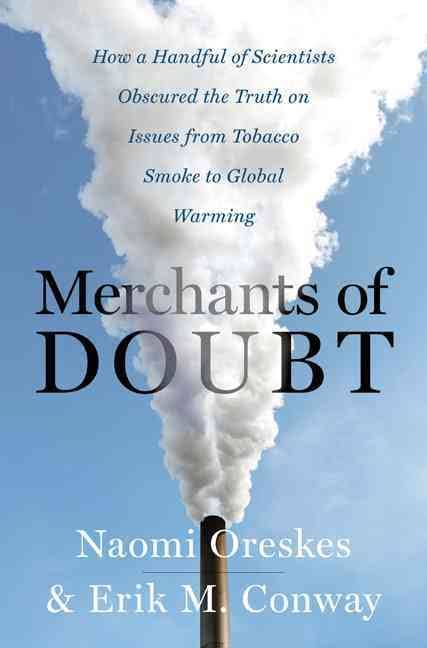Merchants of Doubt: Difference between revisions
Siterunner (talk | contribs) No edit summary |
Siterunner (talk | contribs) No edit summary |
||
| Line 1: | Line 1: | ||
Revision as of 21:19, 31 July 2019
Climate change is often thought of as a partisan issue in the United States, but New York Times journalist Nathaniel Rich says that wasn't always the case.
Rich says that from 1979 until 1989, climate change was viewed as a bipartisan problem — then the the oil industry "descended and bared its fangs" and everything changed.
In his new book, Losing Earth, Rich writes that in the late 1980s, the American Petroleum Institute began paying scientists to write op-eds questioning climate science. He describes the effort as a campaign to "sow propaganda [and] disinformation, to buy off politicians and scientists, and, ultimately, to convert an entire political party to denialism."
Rich says the campaign paid off. No longer was climate science accepted as fact: "All of a sudden," he says, "you have a number of pieces that start to appear that say maybe there's not scientific consensus about this problem."
As a result, the Republican party began to shift its stance on climate change: "It's become a starkly partisan issue," Rich says. "And it seems like we are much further from a solution than we were 30 years ago..."
April 8, 2019 > 'Losing Earth' Explores How Oil Industry Played Politics With The Planet's Fate
Transcript of the Interview by Terry Gross with Nathaniel Rich
March 2019
Via Yale Environment 360 / “We have struck a chord that is resonating with the American people, especially young people. And we’re ready for a fight.”
e360 / Elizabeth Kolbert: So the Green New Deal is obviously a resolution and not a piece of legislation. But is anyone working on a legislative package?
Senator Markey: Yes, that’s what we’re saying — that in each area now, we are calling on members of the House and Senate to introduce their bill. So for example, there is a tax-extender bill, which will potentially be up for debate this year that will include extenders for wind tax breaks, solar tax breaks, electric vehicle tax breaks, tax breaks for storage technologies. And that’s the forum to have that debate.
Each committee in the House and Senate, each member now has an ability to introduce legislation that can deal with the issue. So we’re having hearings.
And what people forget is that Citizens United was decided [by the U.S. Supreme Court] in January of 2010. And that’s what led to a flood of money coming into the system in 2010, and that dropped the overall public acceptance that climate change is real by 20 points. So we’re now back up to 72, 73 percent [who accept the reality of climate change]. And we have a Green New Deal movement that’s been born.
• https://e360.yale.edu/features/facing-pushback-markey-makes-the-case-for-the-green-new-deal
Money in Politics
- Exaggeration, Misinformation, PoliticoPay
"They are going to take your Hamburgers away...."
··········································································
Step Up and Lean In: Politics is Tough
Merchants of Doubt Ply Their Trade, Paid to Spin the Facts
- Naomi Oreskes and Erik Conway Say Be Careful, Very Careful
- Merchants of Doubt -- Documentary Trailers
- More on the Progress and Setbacks of Climate Action @GreenPolicy360
- ○

